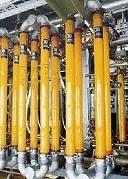
The industrial application of biotechnological processes for the production of chemicals is particularly interesting due to the high specificity of enzymes. Acetic acid bacteria such as Gluconobacter oxydans are already used industrially for regio- and stereospecific oxidations with membrane-bound dehydrogenases. Compared to intracellular enzymes, this has the advantage that substrate and product do not have to be transported through the cell wall.
The Chair of Microbiology at the Technical University of Munich (Prof. Liebl) has succeeded in selectively eliminating the large number of membrane-bound dehydrogenases in Gluconobacter oxydans and is working on introducing special membrane-bound dehydrogenases optimized for specific oxidations, so that only the enzymes required for the intended conversion are present in the cell membrane. This will enable higher product yields and conversion rates.
A prerequisite for the technical application of microbial oxidation is the efficient and cost effective supply of oxygen for acetic acid bacteria in a bioreactor. Trickle bed biofilm bioreactors in which acetic acid bacteria are immobilized on the surface of carrier materials represent the easiest and most inexpensive method to supply microorganisms with oxygen. The water dissolved substrate is guided as a thin liquid layer over the immobilized microorganisms while the gas phase (air) constitutes the continuous phase.
As part of this research project initially the new recombinant Gluconobacter oxydans strains, which will be provided by the project partner, will be investigated how they can be immobilized on carrier materials through the formation of a thin biofilm layer. Afterwards, the process parameters for high product yields and concentrations shall be determined in a sterilizable trickle bed biofilm bioreactor. The scalability of select bio oxidations (Biocatalytic production of functionalized polyalcohols) with immobilized cells shall be evaluated with practical studies using the trickle bed biofilm bioreactor on a laboratory scale and simulation studies.
These studies are financially supported by the German Federal Ministry of Food and Agriculture (BMEL) as part of the PolyBioOx joint project.